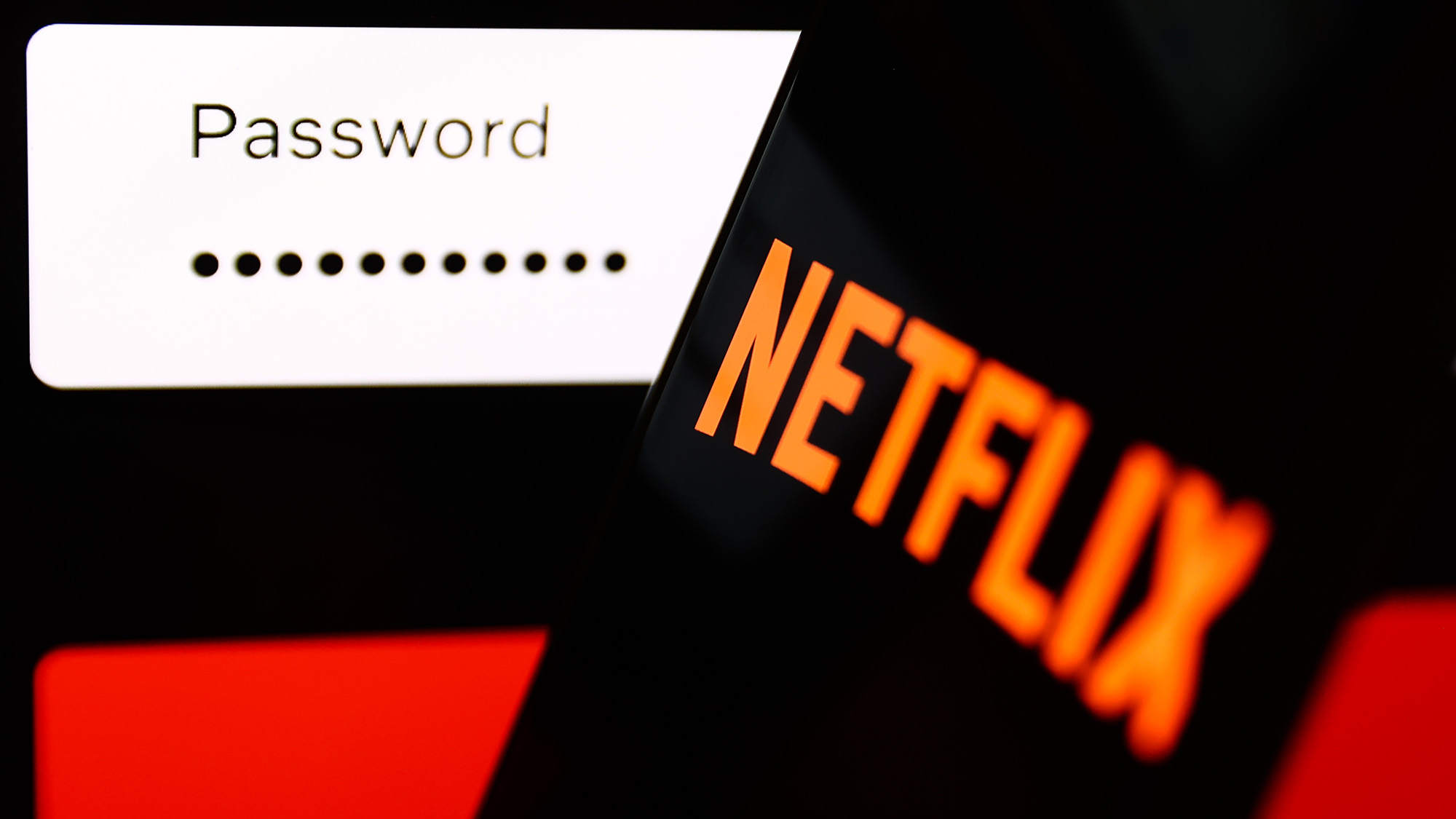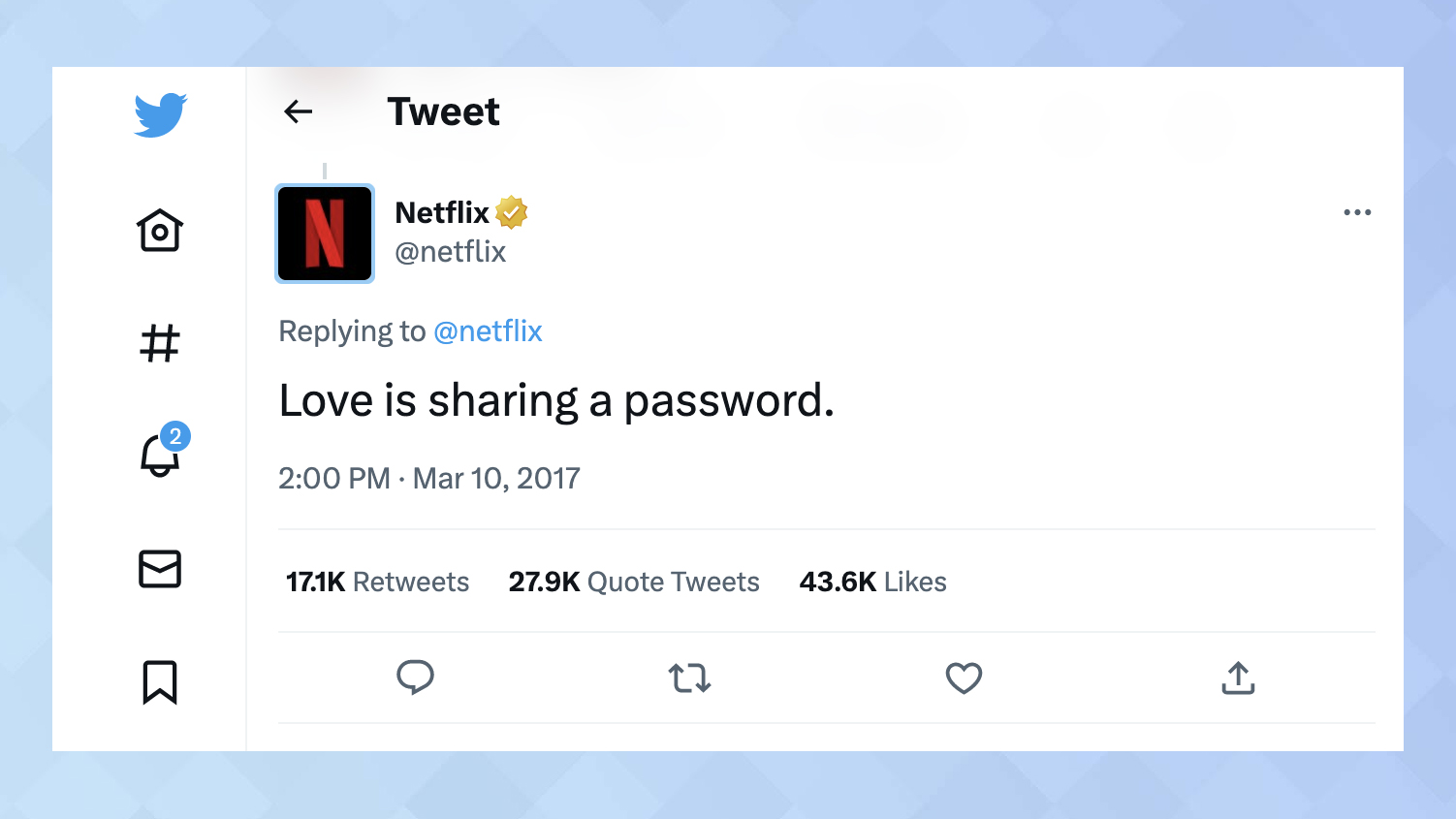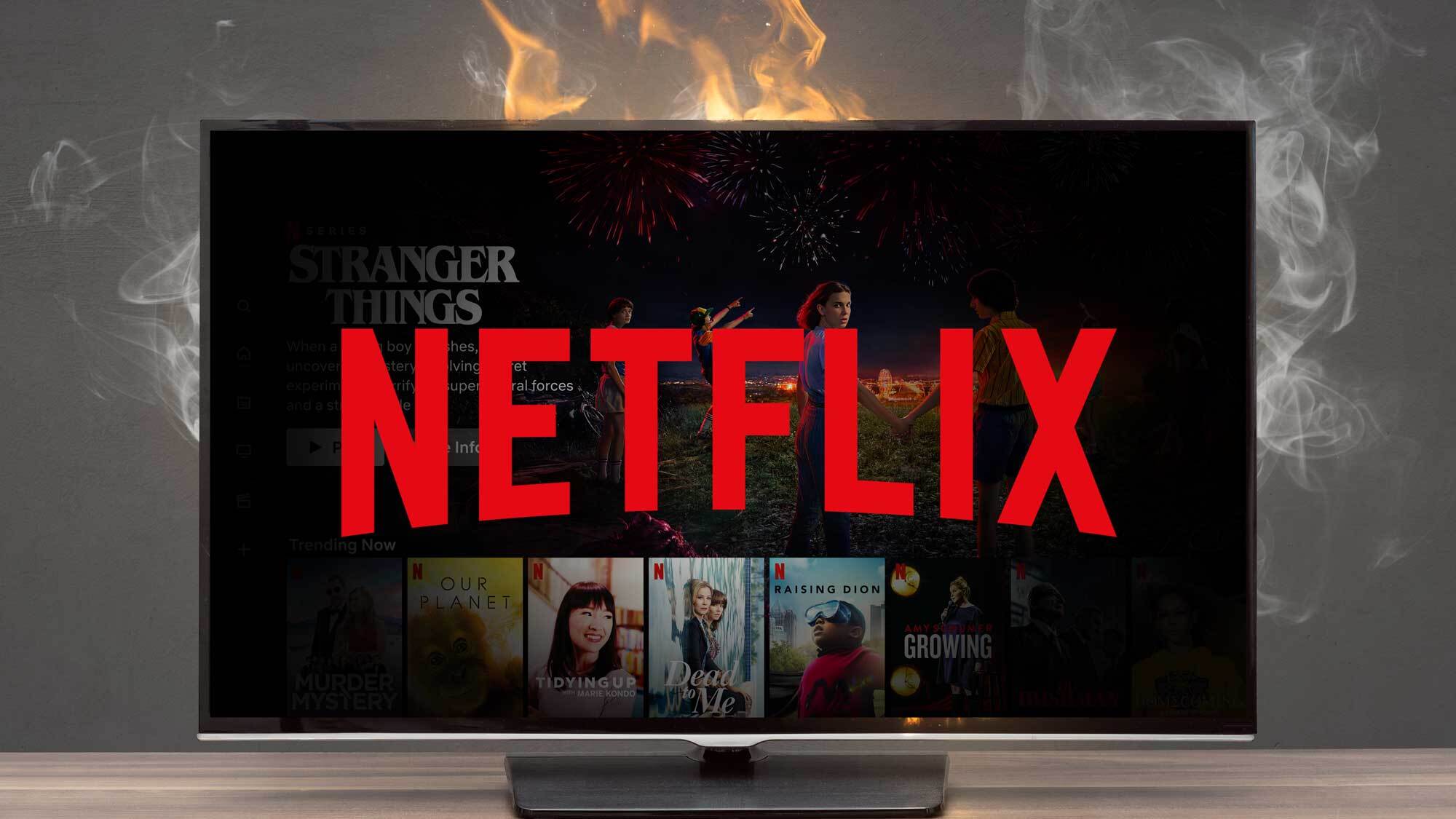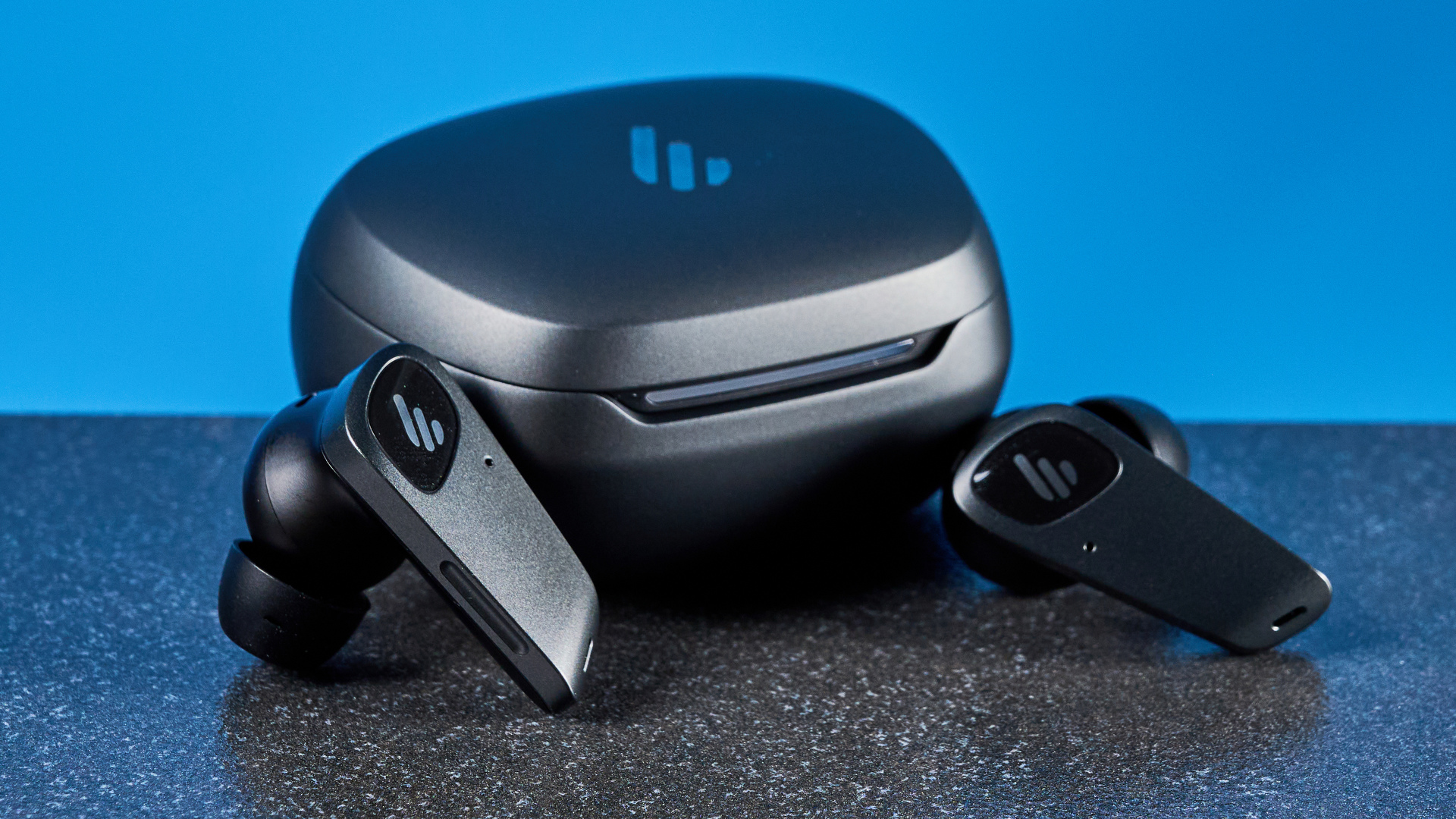Netflix’s password sharing crackdown already feels like a disaster — and it hasn’t launched yet
Netflix's new rules have spread in the worst game of telephone

With Netflix in between big hits, the conversation around the big red streaming machine has turned to its upcoming password-sharing crackdown. For those who haven't heard, it turns out Netflix believes a single Netflix account is only supposed to be shared by those living in the same household.
Netflix will soon introduce preventative measures to stop what it sees as piracy performed by more than 100 million users. Which would be one out of every 2.31 subscribers (per Netflix's Q4 2022 earnings).
Earlier last year, Netflix began a dry-run of its password sharing crackdown, basically beta-testing its ideas on subscribers in Chile, Costa Rica and Peru. It began offering the option to pay around $2.99 (CAD $3.99 / £2.50 / AU$4) for an additional household. Then, it announced that it would be rolling out similar new rules more broadly by the end of this March.

It's pushed every third person I know to drag up Netflix's old "Love is sharing a password" tweet, as if to say "Et tu, Brute?" And, more recently, it's created a massive amount of confusion online because of new rules that were posted, apparently erroneously. But because everyone (outside of Netflix shareholders) hates the news of a password-sharing crackdown, it's going to be hard for anyone to expect those rules won't hit all of us soon.
Because this is all complicated, I'll be including a short synopsis after each section of this story, so nobody walks away with the wrong impression.
Netflix's password sharing crackdown adds Wi-Fi network requirement confusion
A lot of online uproar boiled up on Tuesday (Jan. 31), when an article from The Streamable cited a new rule found in Netflix's Help Center that stated "Netflix is now asking users to connect to the Wi-Fi at your primary location, open the Netflix app or website, and watch something at least once every 31 days."
But, as we noticed (and noted in our explainer on the Netflix password sharing crackdown shortly thereafter), that detail wasn't in the US version of that Help Center page. It turns out, that rule was only still live on the Costa Rican version (as well as pages for Chile and Peru). It felt like some wire was crossed somewhere, that a bad accident was driving people mad.

Then, The Verge found the Internet Archive version of the regular US page, which did in fact have that same language. Netflix would then tell The Streamable that "For a brief time yesterday, a help center article containing information that is only applicable to Chile, Costa Rica, and Peru, went live in other countries."
So, it's bad enough that Netflix has redefined its thoughts on password sharing during a downward moment in the economy (and between must-see Netflix shows, if I'm being frank). But for the company to accidentally post incorrect new rules?
Hell, I would go so far as to say Netflix posting those rules anywhere is the kind of thing that will raise suspicion that they're coming everywhere. Netflix began its password-crackdown testing in Chile, Costa Rica and Peru, so it's not a stretch to think that those countries are merely the beta testers for what we're all going to get.
In short: Netflix is not introducing a mandatory login to the account owner's Wi-Fi network — yet. It's testing that idea elsewhere, though.
Netflix's device-blocking sounds like one hell of a way to anger people
In the U.S. version of the "Sharing your Netflix account" document, terms seem somewhat reasonable. In the "Verifying a device" section, Netflix says you'll need to verify devices it flags by entering a 4-digit verification code sent to the account owner, and within 15 minutes of that code being shared. It's a lot like two-factor authentication.
Costa Rican users have three whole sections about blocked devices: Unblock a device (outside of primary location), Unblock a device (within primary location) and Stop device blocks. In the first, Netflix says that it "may" block devices from watching Netflix when accessing the service outside of "your primary location," or "if your account is accessed persistently from another location." Which will, according to one customer service rep, even include those in the military who share their account with family back home:
Confirmation that @netflix wants those in the military to get their own damn account GREEDY #cancelnetflix pic.twitter.com/2jw0KGSXC3February 1, 2023
These new rules create a whole potential set of other edge-cases that would be reasonable. Let's start with one that affects people who can probably afford to spend $3 more per month: the folks with two homes. You probably know someone with that extra lodging. They'd need to constantly update their primary location.
More annoyingly, Netflix's document for Costa Rica states that travelers should "request a temporary code to give you access to Netflix for 7 consecutive days." It's as if work trips, vacations and living in long-distance relationships weren't hectic enough these days.
In short: Netflix will have you verify your status as account-holder via email in most regions, and it's ready to block devices in Chile, Costa Rica and Peru.
Outlook: Netflix knows this will send some of you into a rage
It's incredibly easily to find irate reactions to this news online. Reactions I'm seeing are about as upset as those from fans of canceled Netflix shows.
Netflix just raised its prices a little over a year ago, and is well used to people canceling their services. And it's ready for another backlash.
The craziest thing about this Netflix nonsense is that all streamers operate by hoping you’re too lazy to cancel. Now it will make your sub a nonstop active and conscious re-validation of a service that only has less and less content ppl care about that gets more expensive!February 2, 2023
Netflix's aforementioned Q4 2022 report explains that "From our experience in Latin America, we expect some cancel reaction in each market when we roll out paid sharing, which impacts near term member growth. But as borrower households begin to activate their own standalone accounts and extra member accounts are added, we expect to see improved overall revenue, which is our goal with all plan and pricing changes."
Which is to say, Netflix is confident. It knows some will leave, and expects that will be offset by those who buy extra member accounts. Because the more draconian Netflix's new rules will be, the more people will have reason to do something about it.
Streaming service subscriptions often recur because people don't think about canceling. Possibly because they forget they subscribe, or because they're happy with what they're getting. Now, Netflix will be challenging some of the subscribers who may stream the most, to see how much their shows are worth. Stay tuned, as we follow Netflix's new rules, and pop some popcorn for the Netflix Q2 2023 report.
Read next: Sling TV getting ABC in several markets — and a price hike
Sign up to get the BEST of Tom's Guide direct to your inbox.
Get instant access to breaking news, the hottest reviews, great deals and helpful tips.

Henry is a managing editor at Tom’s Guide covering streaming media, laptops and all things Apple, reviewing devices and services for the past seven years. Prior to joining Tom's Guide, he reviewed software and hardware for TechRadar Pro, and interviewed artists for Patek Philippe International Magazine. He's also covered the wild world of professional wrestling for Cageside Seats, interviewing athletes and other industry veterans.
